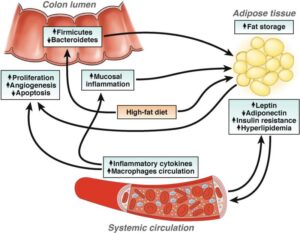Research Interests
 The Alemán lab plans for an independent research program and includes both clinical translational research and basic laboratory investigation. Our laboratory focuses on a central issue in obesity research: what factors in adipose tissues are associated with increased inflammation and insulin resistance, and how are these factors altered by the rapid weight loss, specifically the hormonal and microbiome changes that are associated with bariatric surgery?
The Alemán lab plans for an independent research program and includes both clinical translational research and basic laboratory investigation. Our laboratory focuses on a central issue in obesity research: what factors in adipose tissues are associated with increased inflammation and insulin resistance, and how are these factors altered by the rapid weight loss, specifically the hormonal and microbiome changes that are associated with bariatric surgery?
Our discovery research approach will generate large data sets of genetic and other data for each subject. Because of the variability in the human population, each subject is compared to his/her self. We believe that this unbiased approach is likely to be fruitful and most importantly will uncover factors that differ between patients and will define how patients respond to weight reduction surgery. The large bariatric clinical programs at NYU (Tisch and Bellevue Hospitals) will be accessed and studied in detail.
A second approach of our research is understanding the biology of adipose tissue and its interactions with immune cells, specifically macrophages, in the resolution of obesity-associated inflammation. Crown-like structures (CLS), a pathologic entity of a dying adipocyte surrounded by macrophages, is a defining feature of inflamed adipose tissue. Cross sectional studies in humans show that inflamed adipose tissue, as characterized by the presence of CLS, confers risk for the development of obesity complications such as insulin resistance, cardiovascular disease and certain types of cancers.
We previously showed that rapid weight loss over 7 weeks leads to increased CLS in human subcutaneous adipose tissue without evidence of inflammatory transcriptional programs. I hypothesize that the quantity and quality of lipids out of the dying adipocyte and into CLS macrophage modulates its immune phenotype to separate its inflammatory and metabolic functions. Central to this process is assessing the conversion of metabolic substrates within the adipocyte and adipose tissue macrophage. This research entails metabolic tracking of heavy isotope labeled precursors to determine their fate within adipose tissue macrophages and the surrounding adipose tissue bed. Our scientific program will be informed by the paradigm of macrophage immune phenotypes in atherosclerotic disease reversal spearheaded by the Fisher and Moore groups at NYUMC.